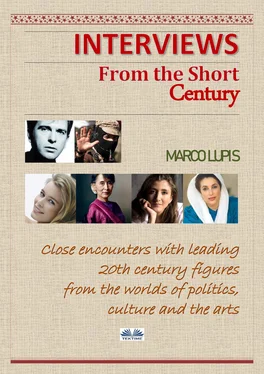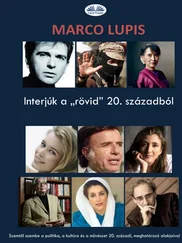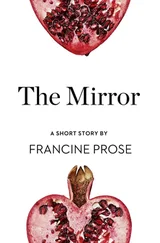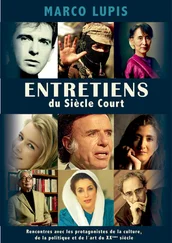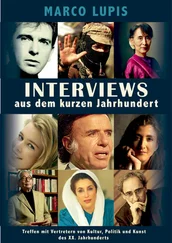Marco Lupis - Interviews From The Short Century
Здесь есть возможность читать онлайн «Marco Lupis - Interviews From The Short Century» — ознакомительный отрывок электронной книги совершенно бесплатно, а после прочтения отрывка купить полную версию. В некоторых случаях можно слушать аудио, скачать через торрент в формате fb2 и присутствует краткое содержание. ISBN: , Жанр: foreign_edu, Биографии и Мемуары, на английском языке. Описание произведения, (предисловие) а так же отзывы посетителей доступны на портале библиотеки ЛибКат.
- Название:Interviews From The Short Century
- Автор:
- Жанр:
- Год:неизвестен
- ISBN:978-8-87-304360-7
- Рейтинг книги:5 / 5. Голосов: 1
-
Избранное:Добавить в избранное
- Отзывы:
-
Ваша оценка:
- 100
- 1
- 2
- 3
- 4
- 5
Interviews From The Short Century: краткое содержание, описание и аннотация
Предлагаем к чтению аннотацию, описание, краткое содержание или предисловие (зависит от того, что написал сам автор книги «Interviews From The Short Century»). Если вы не нашли необходимую информацию о книге — напишите в комментариях, мы постараемся отыскать её.
Interviews From The Short Century — читать онлайн ознакомительный отрывок
Ниже представлен текст книги, разбитый по страницам. Система сохранения места последней прочитанной страницы, позволяет с удобством читать онлайн бесплатно книгу «Interviews From The Short Century», без необходимости каждый раз заново искать на чём Вы остановились. Поставьте закладку, и сможете в любой момент перейти на страницу, на которой закончили чтение.
Интервал:
Закладка:
Whereas the Colombian press have had a laugh at her expense. Semana , the countryâs leading weekly news magazine, lampooned her on the cover as Joan of Arc, complete with horse, armour and lance. The truth is, her book is far more measured and dry than its title and reviews would suggest. Ms Betancourt makes no attempt to hide her privileged background. As a young girl, she would ride horses every week at a farm owned by friends.
But she is full of ideas and has no difficulty putting them into words. âConservative estimates suggest that in 1998, Colombia's biggest guerrilla group, FARC, received annual funding of about three hundred million dollars, most of which came from drug trafficking, kidnapping and extortion. Today, that figure is close to half a billion dollars, and its membership has increased from fifteen thousand to twenty-one thousand. This situation,â she continues, âis putting the Colombian government at a huge disadvantage in their fight against the rebels. In order to secure a decisive victory, we believe that the government would have to deploy three or four highly trained soldiers for each FARC guerrilla, whereas the most they can currently send out is two. And all this requires an economic outlay that my country simply canât afford. Since 1990, the cost of suppressing the rebels has increased nearly ten fold. At the beginning, it was costing one per cent of GDP but now it is more than two per cent - one billion US dollars...it's astronomical.â
So is she a hot-headed fanatic, like her enemies claim, or simply a woman who wants to do something for her country, which is how she sees it? The political elite in Bogotá are trying to ignore her candidature, but they are gradually starting to fear her. Omar, her chief bodyguard, pipes up: âIn this country, you can pay for honesty with your life.â Ms Betancourt interjects quickly: âIâm not afraid of dying. Fear keeps me on my toes.â
Fighting corruption is at the forefront of her campaign, closely followed by the civil war. âThe State should have no qualms about negotiating with the left-wing guerrillas,â she concludes, âunlike the right-wing paramilitary group the AUC, which is responsible for most of the murders that take place in Colombia.â
So how does she live with fear and threats on a daily basis?
â I think, in a funny kind of way, you get used to it. Not that you should have to. The other day,â she concludes calmly, âI received a photo of a dismembered child in the post. Underneath it was written: âSenator, we have already hired a hit man to take care of you. Weâre reserving special treatment for your sonâ¦ââ.
6
Aung San Suu Kyi
Winner of the 1991 Nobel Peace Prize
Free from fear
Following considerable pressure from the United Nations, Aung San Suu Kyi was released on 6 May 2002. It made headlines around the world, but her freedom was short-lived. On 30 May 2003, a group of soldiers opened fire on her convoy, killing many of her supporters. She survived thanks to the quick reflexes of her driver Ko Kyaw Soe Lin, but she was again put under house arrest.
The day after her release in May 2002, I used some of my contacts within the Burmese opposition to arrange an interview with Ms Suu Kyi vie email.
*****
At ten oâclock yesterday morning, the guards stationed outside the home of Aung San Suu Kyi, the leader of the Burmese opposition National League for Democracy (NLD), quietly returned to their barracks. And so it was, in a surprise move, that the military junta in Rangoon lifted the restrictions it had placed on the movement of the pacifist leader known simply in her homeland as âThe Ladyâ, a woman who won the Nobel Peace Prize in 1991 and had been under house arrest since 20 July 1989.
So ever since ten oâclock yesterday morning, after a period of nearly thirteen years, Aung San Suu Kyi has been free to leave her lakeside house, speak to whomever she wants, be politically active and see her children.
But is this really the end of the period of isolation for the Burmese Pasionaria? The exiled opposition still do not believe the grand declarations from the military junta, which said it was freeing Ms Suu Kyi unconditionally.
They would rather wait and see. And pray. Indeed, since yesterday, the Burmese diaspora have already held prayer demonstrations in Buddhist temples in Thailand and other parts of eastern Asia.
As for The Lady herself, she too has wasted little time. She was immediately driven to the headquarters of the NLD, which had won a landslide victory (nearly sixty per cent of the vote) in the 1990 elections while the governing National Unity Party (NUP) secured just ten of the four hundred and eighty-five seats. The military government annulled the results, outlawed the opposition (imprisoning or exiling its leaders) and violently suppressed any protests. Parliament was never convened.
The Italian edition of your autobiography is called Libera dalla paura [Free From Fear]. Is that how you feel now?
Yes, for the first time in more than a decade, I feel free. Physically free. Free to go about my business and think, above all. As I explain in my book, however, Iâve felt âfree from fearâ for many years. Ever since I realised that the tyranny here in my country could harm humiliate or even kill us, but they couldn't scare us anymore.
You've only just been released, but youâve said today that there are no conditions on your freedom and that the governing military junta has even authorised you to leave the country. Do you really believe that?
In a press release issued yesterday evening, a spokesperson for the junta spoke of âa new chapter for the people of Myanmar and the international communityâ. Hundreds of political prisoners have been released over the last few months, and the military has assured me that they will continue to set free those who, in their words, âdo not present a danger to societyâ. Everybody here wants to believe, wants to hope that this really is a sign of change. A sign that we are back on the path towards democracy, which was so suddenly and violently cut off in the coup of 1990. It is a path that the Burmese people have never forgotten.
Now that you have been freed, are you not scared of being expelled and distanced from your supporters?
Let me be clear: I will not leave. I am Burmese, and I turned down British citizenship precisely because I didnât want to give the regime any excuses. Iâm not afraid, and that gives me strength. But the people are hungry, which frightens them, and that makes them weak.
You have strongly denounced, on several occasions, the military's attempts to intimidate anyone who sympathises with the NLD. Is that still going on today?
According to the figures we have, in 2001 alone the army arrested more than one thousand opposition activists under orders from SLORC [State Law and Order Restoration Council] generals. Many others have been forced to resign from the League [NLD] after being submitted to intimidation, threats and other wholly unjustified and unlawful pressures. Their meticulous method is always the same: unleash units of government officials who go from door to door across the entire country asking citizens to leave the League. Those who refuse are blackmailed with the threat of losing their jobs, or worse. Many branches of the party have closed down, and the military checks the number of people who have quit on a daily basis. This shows how afraid they are of the League. Every one of us hopes that all this is now really over.
Did the military's decision to release you take you by surprise, or was it something they had been planning for a while because they were conscious of their global reputation?
Читать дальшеИнтервал:
Закладка:
Похожие книги на «Interviews From The Short Century»
Представляем Вашему вниманию похожие книги на «Interviews From The Short Century» списком для выбора. Мы отобрали схожую по названию и смыслу литературу в надежде предоставить читателям больше вариантов отыскать новые, интересные, ещё непрочитанные произведения.
Обсуждение, отзывы о книге «Interviews From The Short Century» и просто собственные мнения читателей. Оставьте ваши комментарии, напишите, что Вы думаете о произведении, его смысле или главных героях. Укажите что конкретно понравилось, а что нет, и почему Вы так считаете.
